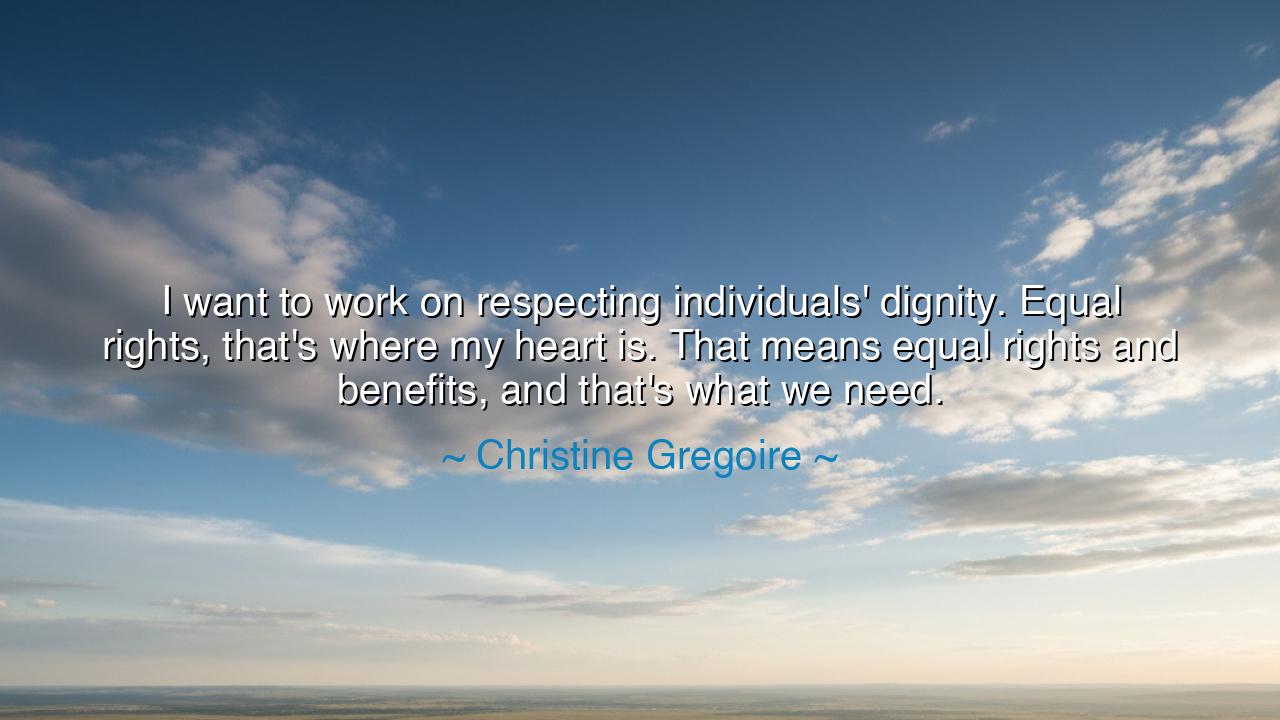
I want to work on respecting individuals' dignity. Equal rights
I want to work on respecting individuals' dignity. Equal rights, that's where my heart is. That means equal rights and benefits, and that's what we need.






“I want to work on respecting individuals’ dignity. Equal rights, that’s where my heart is. That means equal rights and benefits, and that’s what we need.” These words of Christine Gregoire, the former governor of Washington State, resound with both compassion and conviction — the steady voice of a leader whose soul was bound to the service of justice. Her words are not merely political; they are moral, spoken in the tone of one who recognizes that equality is not an abstract law but a sacred responsibility. In her declaration lies a truth as old as civilization itself: that the worth of a nation is measured not by its wealth or armies, but by its respect for human dignity.
When Gregoire speaks of “respecting individuals’ dignity,” she names the heart of all human rights. Dignity is the invisible crown that belongs to every soul — not given by kings, governments, or institutions, but inherent by birth. To respect it is to acknowledge that no human being may be reduced to a means, a label, or a number. She understood that true equality begins not in legislation but in perception — in how we see one another. For every act of injustice begins with the failure to see dignity in another’s face. Thus, Gregoire’s call is not just for equal rights, but for a transformation of the heart, where compassion becomes law and empathy becomes policy.
The origin of her words lies in the long and continuing struggle for equality that has shaped the American spirit. Gregoire, as governor, fought to expand civil rights protections and to recognize the humanity of communities long marginalized — particularly in her support for same-sex marriage and equal benefits under the law. Her work stood as part of a larger arc that stretched back through time — to the abolitionists who broke the chains of slavery, to the suffragists who raised their voices for women’s rights, and to the civil rights leaders who faced down hatred with courage. She spoke not as one standing apart from history, but as one carrying its flame.
Her words find deep resonance in the story of Eleanor Roosevelt, who, decades before, chaired the drafting of the Universal Declaration of Human Rights in 1948. Roosevelt, too, believed that the foundation of peace and justice lay in the recognition of each person’s dignity. When nations sought to rebuild after the ruins of war, it was this document — born of suffering, hope, and wisdom — that declared the eternal truth: “All human beings are born free and equal in dignity and rights.” Christine Gregoire’s voice, echoing across generations, carries the same timeless conviction — that equality without dignity is hollow, and dignity without equality is incomplete.
But Gregoire’s wisdom is also practical. When she says, “equal rights and benefits, that’s what we need,” she reminds us that justice is not fulfilled through lofty ideals alone — it must be embodied in daily life. The worker must receive fair wages; the child must have access to education; the couple, regardless of gender, must share the same protections and privileges before the law. To fight for equality is not to engage in abstraction; it is to confront the lived inequities of human experience and to transform them through courage and compassion. For as long as one person’s rights are denied, the dignity of all remains wounded.
Yet there is also in her words a warning — that the pursuit of equality cannot be left to governments alone. Respecting dignity is a duty that belongs to every citizen. It begins in the home, in the workplace, in every word we speak and every judgment we form. Equality dies not through the sword, but through indifference — when we turn away from those whose pain does not touch us directly. Gregoire’s heart, she says, is with equal rights; but she invites us all to make it our heart as well. To live without that awareness is to betray the humanity that binds us together.
So let these words of Christine Gregoire be remembered as both teaching and commandment: honor the dignity of every person, for in doing so, you honor your own. Seek equality not as a gift, but as a duty; not as a slogan, but as a way of life. Work for it in your communities, defend it in your laws, and embody it in your actions. For only when all men and women walk side by side — not one above another, not one forgotten or despised — will the world breathe in harmony with the truth that has guided the righteous through every age: that to respect human dignity is to fulfill the very purpose of justice itself.






AAdministratorAdministrator
Welcome, honored guests. Please leave a comment, we will respond soon